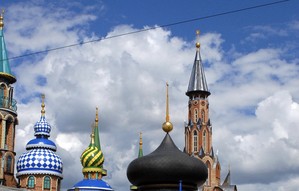Prisma Ukraïna Workshop
Two-day workshop with keynote lectures by Yohanan Petrovsky-Shtern, Crown Family Professor of Jewish Studies and Professor of History at the Northwestern University in Evanston and Chicago, and by Armina Omerika, Professor of Intellectual History of Islam at the Goethe University in Frankfurt (Main).
Call for Papers (Closing date: 15 April 2018)
Please register: prisma(at)trafo-berlin.de
A cooperation of Prisma Ukraïna and Deutsche Gesellschaft für Osteuropakunde (DGO)
Rationale
Processes of migration and an increasing number of refugees from the South or East of the Mediterranean have renewed the debate about religious and ethnic pluralism and the limits of a liberal political order in Europe. The migration of Muslims and the integration of the religion of Islam, in particular, divides public opinion and policies in and between European states and societies. From the 18th to the 20th century the debate on the treatment, the civil, legal, national and political status of the Jews in Western Europe was called the Jewish question. The majority of Jews, however, historically lived in Eastern Europe. Today, the majority of Europe’s Muslims, too, are not immigrants but indigenous to the societies in the East and the Southeast of Europe. In fact, religious and ethnic diversity has long been substantial to the societies of Eastern Europe, but is hardly referred to when the place and the rights of Jews and Muslims in European societies and histories are questioned and experiences of religious and ethnic pluralism are evaluated.
In our workshop we would like to address and map out the experiences of the adherents of two large non-Christian religions, of Jews and Muslims in Eastern and Southeast Europe from around 1800 to this date. We are interested in the historical legacies of empire, Ottoman, Russian, Austro-Hungarian or Soviet, in the trajectories of reform and orthodoxies, in processes of confessionalisation and secularization, in the politics of religion and minority, the ways nation states accommodated religious and ethnic pluralism. How did Muslims and Jews imagine their place in empire, nation and society, as individuals, as citizens, as communities? Though not neglecting multiple experiences of discrimination and violence that members of these two large non-Christian religions were and are exposed to, we are especially keen on learning examples of integration and symbiotic relations between Muslims and Jews as well as between those two religious groups and other communities. We are interested in case studies related to, for instance, Crimean Tatars, inhabitants of Bashkortostan and Tatarstan, other Russian Muslims, Muslims from the Balkans, Caucasus and Central Asia, as well as the Jews – including Karaites – of Russia, Poland, Ukraine and other postsocialist countries. We look forward to historical accounts and studies related to contemporary Islam and Judaism, both comparative and dealing with just one religion. Workshop papers could address following questions, among others:
How is religious diversity understood in Eastern Europe? Is it understood in relation with concepts of religious tolerance and peaceful coexistence as they exist in the discourses in Western European countries? Or do we witness attempts to propose alternative ideas about religious diversity, for example as a characteristic of the “Eurasian space”?
How did East European states and empires deal with Judaism and Islam? What were state policies vis-à-vis Judaism and Islam in times of empires and the Soviet Union? How do contemporary postsocialist states approach Judaism and Islam? What place do Muslims and Jews have in imperial or national self-perceptions, for example in the curricula of schoolbooks or in museums?
How did/do state and regional administrations deal with the tension between religions and secularism?
What role did/do Jews and Muslims assume in society and economy? What were/are their experiences with the army, state bureaucracy, universities, state enterprises and other institutions?
Which ideas and practices did/do circulate within and among those religions both in the region itself and between Eastern Europe and other world regions? Which ideas and practices were/are shared between representatives of Judaism and Islam in Eastern Europe and the rest of the society they live in? Who were/are the individuals that enabled the transfer of ideas and practices? How did ideas related to Jewish and Islamic enlightenment emerge and how were they perceived by East European states and societies?
What official categories do emerge in East European states and societies to distinguish between “local” and “external” forms of religiosity? How can we understand concepts such as “traditional Islam” in Russia and in the Balkans?
How did/do political ideologies (and theologies) emerging within Judaism and Islam in Eastern Europe relate to more general ideologies (such as conservatism or liberalism) that were/are popular in the region?


